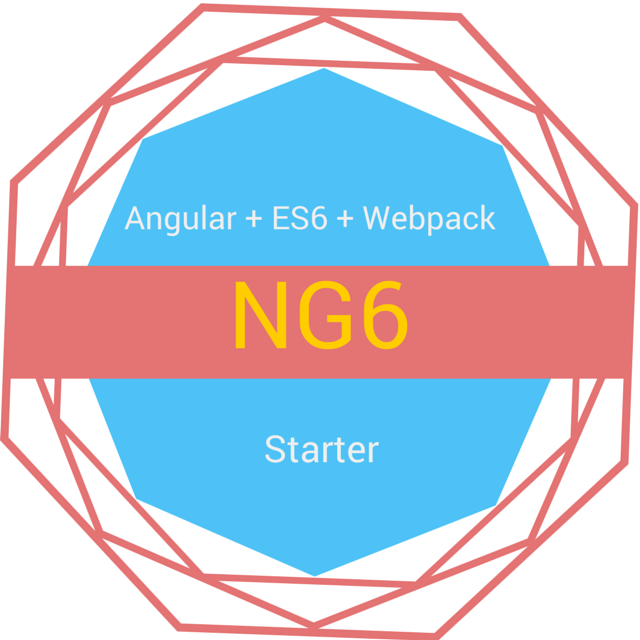This repo serves as an extremely minmal starter for anyone looking to get up and running with Angular and ES6. Using a combo of Gulp and Webpack for building our files and assiting with boilerplate. This seed is not a yeoman generator! Its just a minmal starter with tasks to build and create boilerplate. Features include:
- Best practice in file organization for Angular
- Ready to go build system for working with ES6
- Task for generating component boilerplate with angular, including test
- Testing system ready to go
- Stylus support
NG6 uses Gulp and Webpack together for its build system. Yes, you don't need Gulp if you'r using Webpack. This is true if you're build system is only responsible for file manipulation, which ours is not.
Webpack handles all the file related things. This inlcudes:
- Transpiling from ES6 to ES5 with
Babel - Loading HTML files as modules
- Loading CSS and Stylus files and appending the styles to the DOM
- Bundling our app
- Loading any and all modules
- Doing the same for testing as well
Gulp is like the orchestrator, it handles:
- Starting and calling webpack
- Starting a dev server (yes webpack can do this too)
- Refreshing the browser and rebuilding on file changes
- Generate boilerplate for our angular app
We use the component approach in NG6. This will be a standard if using the new router in angular and a great way to insure easy transition to Angular 2. Everything or mostly everthing is a component. A component is a self contained app basically. It has its own style, template, controllers, routing, specs, etc. All capsulated in its own folder. Here's how it looks:
client
--app/
----app.js * entry file for app
----app.html * template for app
----components/ * where most of components live
------components.js * entry file for components
------home/ * home component
--------home.js * home entry file
--------home.component.js * directive for home
--------home.controller.js * controller for home
--------home.styl * styles for home
--------home.html * template for home
--------home.spec.js * specs for home
----common/ * where common things in our app live
All test are written in ES6 too because why not! So we use Webpack to take care of all the logistics of getting those files run in browsers just like our client files. Karma combined with webpack will run al files that match .spec.js inside the app folder. This is awesome because we can write tests for our components in the same folder with the rest of the component. spec.bundle.js is the bundle file for all our spec files that karma will run. Our testing setup is:
- Karma
- Webpack + Babel
- Mocha
- Chai
To run test just npm test or karma start.
What you need to run this app:
nodeandnpmOnce you have those, you should install these globals withnpm i -g:karma-cligulpkarmawebpack
forkmecloneyour forknpm ito install all dependencies
NG6 uses Gulp to build and start the dev environment. After you have installed all dependencies you can now run the app.
Run gulp to start bundle with webpack, start a dev server and watch all files. The port will displayed to you.
Here's a list of possible Gulp task to run:
webpack- runs webpack which will transpile, compile, and bundle all assets and modules into
client/bundle.js
- runs webpack which will transpile, compile, and bundle all assets and modules into
serve- starts a dev server with
browser-syncserving the client folder
- starts a dev server with
watch- listens for file chagnes and rebuilds with webpack then refreshes the browser
default- runs
webpack,serve, andwatchin that order.
- runs
component- builds out boilerplate for a new angular component, read below to see how to use this in more detail
To run test, just run npm test or karma start.
Be sure to include your spec files in the appropriate component directory. You must name the spec file like so, [name].spec.js. If you don't want to use the .spec.js extentsion, you must change the regex in spec.bundle.js to look for whatever file(s) you want.
Mocha is the testing suite being used and chai is the assestion library. If you would like to change this, change it in karma.conf.js.
Following a good practice allows us to garuntee certain things. We can take advantage of these garuntees and use a task to automate things. Because the components we make will almost always have the same structure, we can generate this boilerplate for you. Boilerplate includes:
- Component folder
- Component entry file which will
importall of its dependencies - Component component file, or directive file will will also
importits dependencies - Component template
- Component controller
- Component styl, a stylus file for the component. can replace with css, less, or sass
- Component spec with passing tests already written
You can create all this by hand, but it gets old fast!
To generate a component, we must use the gulp component --name componentName task.
The --name flag is the name of the component you want to create. Besure to be unique, or it will override an existing component.
The component will be created by default on the root of client/app/components.
We can change this by passing in the --parent flag.
You can pass in a path relative to client/app/components/ and your component will be made there.
So running gulp component --name signup --parent auth will create a signup component at client/app/components/auth/signup.
Running gulp component --name footer --parent ../common will create a footer component at client/app/common/footer.
Because --name is used to create folder name too, use camel or snakeCase and stay consitant.
enjoy -- Angular Class
